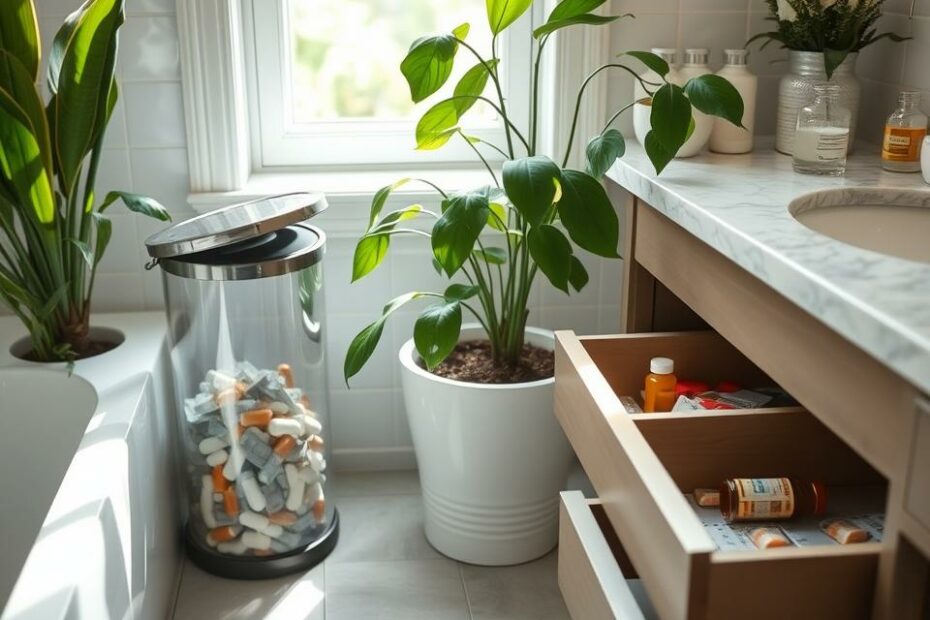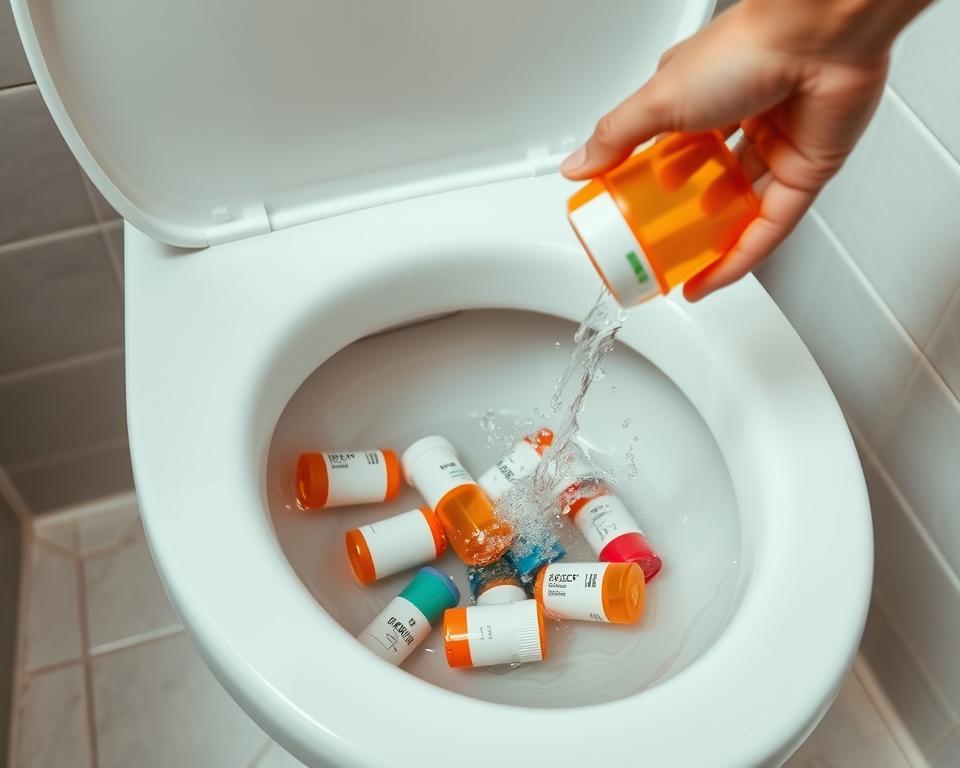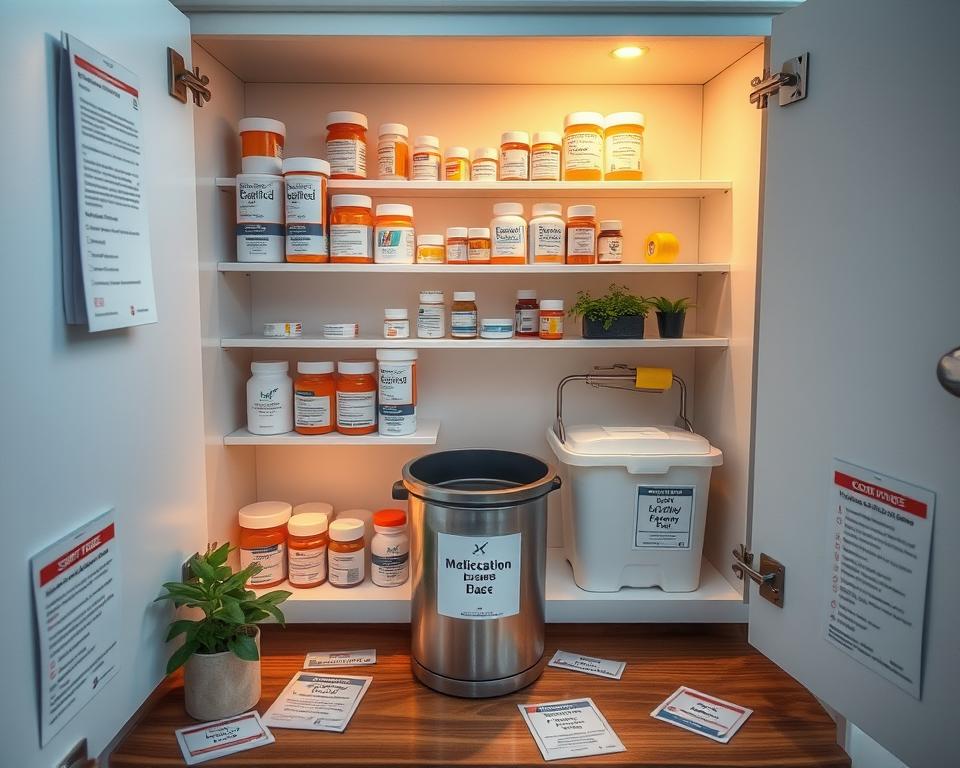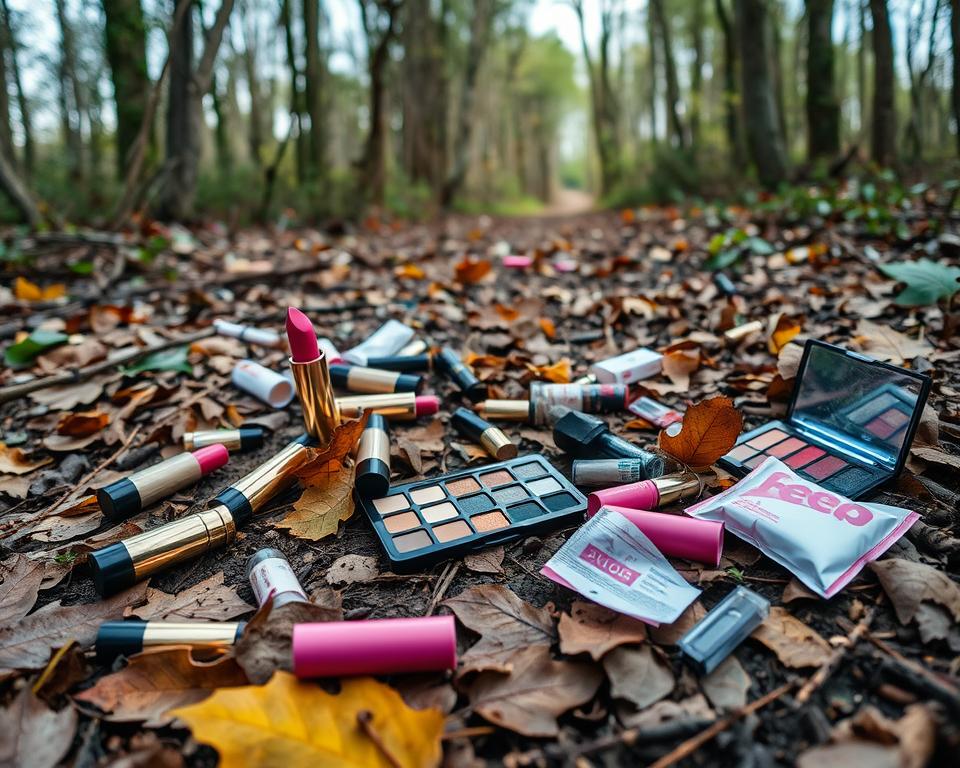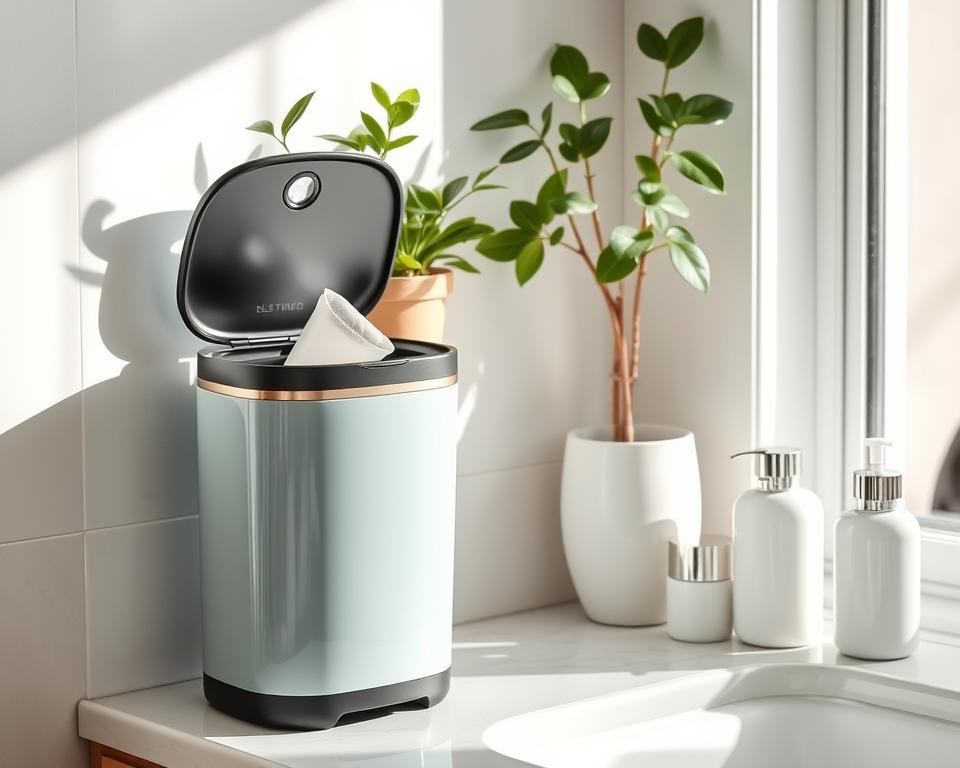Did you know that about 60% of adults in the United States take prescription medication every day? With so many medicines around, it’s key to know how to dispose of them right. This helps keep us and our environment safe.
Your medicine is for you alone. What’s safe for you might harm someone else. It’s best to get rid of expired, unwanted, or unused medicines through a drug take-back program. Or, follow safe disposal steps at home. Not doing so can be risky and bad for the environment, so learning how to dispose of medicines safely is important.
Key Takeaways
- Safely dispose of unused or expired medicines to prevent accidental or intentional misuse.
- Drug take-back programs and local collection events offer convenient ways to dispose of medications responsibly.
- Certain medicines, like fentanyl patches, should be flushed down the toilet to avoid potential harm.
- Medicines not on the FDA’s Flush List can be safely disposed of in the household trash with proper preparation.
- Proper medication disposal helps protect the environment and water supply from pharmaceutical contamination.
Importance of Proper Medicine Disposal
It’s key to dispose of medicines right to keep your family, community, and the environment safe. Throwing medicines in the trash or flushing them can harm kids, pets, and water. It also affects fish and food in the water. The right way to get rid of medicines helps avoid these problems.
Risks of Improper Disposal
Many people don’t dispose of medicines correctly. A survey found 35.4% of people threw away expired meds by flushing them. Another study showed over 50% of people also flushed their meds down the toilet. This can badly harm the water and the life in it.
Environmental Concerns
Throwing away medicines wrong can hurt the environment a lot. Less than 1% of urology surgery patients returned unused prescribed narcotics to a pharmacy for proper disposal. Nurses in hospice care often threw meds down the sewer, 55% of them. This pollutes water and messes up nature. Among Medicare members, 11% of medications were discarded through medication take-back programs while 9% were flushed down the toilet. We need better ways to get rid of medicines.
It’s crucial to dispose of medicines right to protect our planet and communities. Knowing the dangers of wrong disposal and the need for the right methods helps us all. Together, we can keep our world safe and healthy for the future.
Drug Take-Back Programs
It’s important to get rid of unused or expired medicines safely. This stops accidental misuse, drug abuse, and pollution. Luckily, there are many drug take-back programs to help you dispose of unwanted medicines responsibly.
National Prescription Drug Take-Back Day
The U.S. Drug Enforcement Administration (DEA) organizes National Prescription Drug Take-Back Day. They set up temporary sites across the country. It’s a great chance to safely get rid of unused or expired prescription drugs.
Local Disposal Programs
Local police and pharmacies have their own drug take-back programs all year. They let you safely and privately return unused or expired medicines. To find a site near you, just search “drug disposal near me” or “medication disposal near me” on Google Maps.
| Type of Drug Take-Back Option | Description |
|---|---|
| Permanent Collection Sites | These include facilities like retail, hospital, or clinic pharmacies, as well as law enforcement facilities. These sites may offer on-site medicine drop-off boxes, mail-back programs, or other in-home disposal methods. |
| Periodic Take-Back Events | The DEA and local law enforcement agencies organize these events, setting up temporary drug collection sites in communities. |
Using these drug take-back programs is easy and helps a lot. It makes sure your unused or expired medicines are thrown away right. This protects our environment and stops misuse.
Dispose of medicines
When you can’t find a drug take-back program, you have two choices. You can either flush certain medicines or throw them away in the trash. It’s crucial to do it right to keep everyone safe and the environment clean.
Flushing Medications
The U.S. Food and Drug Administration (FDA) says to flush some medicines, like opioid painkillers, down the toilet if you can’t find a take-back program. This stops people from taking them by mistake or on purpose, which can be very dangerous. The FDA has a list of medicines that should be flushed if there’s no take-back option.
Disposing in Household Trash
If a medicine isn’t on the FDA’s flush list, you should throw it away in the trash. Here’s how to do it safely:
- Take the medicine out of its original container and mix it with something unappealing, like kitty litter or used coffee grounds.
- Put the mixture in a bag, can, or other container to keep it from being found.
- Make sure to remove any personal info from the original packaging to keep your privacy safe.
- Put the sealed container in the trash. Don’t flush these medicines down the sink or toilet.
It’s very important to dispose of medicines properly. This helps keep people safe and the environment clean. By following these steps, you can help prevent poisonings, addiction, and pollution.
Flushing Certain Medicines
The U.S. Food and Drug Administration (FDA) has a list of medicines to flush down the sink or toilet. This is if you can’t find a take-back program. These include strong opioid painkillers like Suboxone and OxyContin. They can be very dangerous if someone, especially a child or pet, accidentally takes them.
FDA’s Flush List
The FDA’s “Flush List” shows medicines to flush when no take-back program is available. These are often opioid painkillers. They are dangerous if someone else takes them by mistake.
Studies show flushing these medicines doesn’t harm the environment much. The FDA says the risk of harm to people is much bigger. They are working to make sure flushing these drugs is safe for the environment too.
Always check if your medicine is on the FDA’s Flush List. Only flush it if you can’t find a take-back program. It’s better to use drug take-back programs or follow safe disposal steps at home.
Disposing Medicines in Household Trash
If there’s no drug take-back program near you, and your medicine isn’t on the FDA’s Flush List, you can throw it away. But first, make sure to follow some steps to dispose of it right.
Preparing for Disposal
To get ready to throw away your medicines, do these things:
- Take the medicines out of their original containers.
- Mix the medicines with something unappealing, like used coffee grounds or cat litter. This makes the medicine less tempting for kids and pets, and hides it in the trash.
- Put the mix in a sealed container or bag before throwing it away.
By doing these easy steps, you can safely dispose of medicines in the trash. This helps prevent accidents or misuse of the medicines.
| Medication Disposal Methods | Pros | Cons |
|---|---|---|
| Drug Take-Back Programs | Safe, secure, and good for the environment | May not be available everywhere |
| Household Trash Disposal | Easy option if take-back programs aren’t around | Needs extra steps to hide and secure the medicines |
| Flushing Certain Medications | Quick way to get rid of dangerous drugs | Can pollute water systems |
By following these tips, you can dispose of medicines in the trash safely and responsibly. This reduces the chance of accidents or harming the environment. Remember, proper medication disposal helps keep our community healthy and green.
Special Considerations
When it comes to disposing of certain medications, special precautions are necessary. Two products that require extra attention are fentanyl patches and inhaler products.
Fentanyl Patches
Fentanyl patches are used to deliver a powerful opioid medication. Even after use, they can still contain a lot of the drug. The FDA recommends flushing them down the toilet.
This method helps prevent accidental exposure or misuse of the leftover fentanyl. It’s especially dangerous for children.
Inhaler Products
Inhaler products, like those for asthma or COPD, should not be punctured or thrown into fire or incinerators. They may contain propellants that could be hazardous if ruptured or burned. Instead, users should contact their local trash and recycling facility for guidance on disposal.
By following these special considerations for fentanyl patches and inhaler products, individuals can ensure safe and responsible disposal. This minimizes the risk of accidental exposure or environmental harm.
Impact on Water Supply
Proper disposal of medications is key because bad disposal harms the water supply and the environment. Studies show that flushing medications down the drain can pollute lakes, streams, and even drinking water. This pollution can hurt aquatic life and might risk human health.
Many communities find antibiotics, hormones, and antidepressants in their water. These substances can cause antibiotic-resistant bacteria and upset the balance of aquatic ecosystems.
The U.S. Food and Drug Administration (FDA) and Environmental Protection Agency (EPA) have set guidelines for medication disposal. They suggest using take-back programs or following specific disposal instructions. This is better than flushing drugs down the toilet or sink.
By disposing of medications correctly, we can reduce the environmental impact and protect our water supply. This helps the environment and keeps us healthy and safe.
Medication Management Tips
Managing your medications is key to avoid having unused or expired medications. Here are some easy tips to keep your pharmaceutical waste under control:
- Always check the expiration dates of your medications. Throw away any that have expired to prevent health risks.
- Make a list of the medications you have at home. Include how much and how often you take them. This helps you avoid buying unused medications.
- Only buy what you need for the next few days. Buying too much can lead to expired drugs.
- If you have leftover or unwanted medications, dispose of them properly. Use a local drug take-back program or follow safe at-home disposal methods.
Effective medication management protects your family’s health and the environment. It prevents the dangers of not disposing of pharmaceutical waste correctly.
| Statistic | Value |
|---|---|
| Yearly hospital admissions due to drug-related injuries | 2 million |
| Percentage of medicines best disposed of through take-back programs | TBD |
| Ratio of law enforcement agencies participating in take-back programs | TBD |
| Occurrence rate of take-back bins at Nationwide Children’s Hospital Pharmacy | TBD |
| Proportion of medicines safely disposable at home | TBD |
By following these medication management tips, you can lessen the harm to the environment. You also keep your family safe from unused medications and expired drugs.
Conclusion
It’s very important to dispose of medication disposal safely. This helps keep public health and environmental protection safe. Using safe drug disposal programs or proper at-home methods is key.
By doing this, we prevent accidents, misuse, and harm to the environment. Always check the FDA’s Flush List. Also, prepare medications for trash disposal at home. And, manage your medications well to avoid unwanted drugs.
Research shows many people don’t dispose of medicines right. In places like Ethiopia and Bangladesh, the rates are low. But, by acting responsibly, we can make our community safer and protect our environment.
Let’s all work together to dispose of medicines properly. This way, we can keep our loved ones and the planet safe. It’s our duty to handle medication disposal with care.
FAQ
What is the best way to dispose of expired, unwanted, or unused medicines?
The best way to get rid of expired or unused medicines is through a drug take-back program. If that’s not available, you can dispose of them safely at home. It’s important to know how to do it right to avoid risks and protect the environment.
Why is proper medicine disposal important?
Proper disposal of medicines is key to keep your family, community, and the environment safe. Throwing medicines in the trash or flushing them can harm children, pets, and water supplies. It also affects aquatic life and the food chain.
What are drug take-back programs?
The DEA sponsors National Prescription Drug Take-Back Day events across the country. These events offer a safe way to get rid of unwanted or expired medications. Many local police and pharmacies also have their own programs all year round.
What are the options for disposing of medicines at home?
If you can’t find a drug take-back program, you have two options at home. You can either flush certain medicines or dispose of them in the trash. It’s crucial to follow the right steps for each method to dispose of your medicines safely.
Which medicines should be flushed down the sink or toilet?
The FDA has a list of medicines that should be flushed when you can’t find a take-back program. These include some opioid painkillers. They can be dangerous if taken by mistake or misused.
How should I dispose of medicines in the household trash?
If your medicine isn’t on the FDA’s Flush List and you can’t find a take-back program, dispose of it in the trash. Remove the drugs from their containers and mix them with something like used coffee grounds. This makes them less appealing to kids and pets. Then, put the mixture in a sealed bag before throwing it away.
Are there any special considerations for disposing of certain products?
Yes, some products like fentanyl patches and inhalers need special care when disposing of them. Fentanyl patches should be flushed down the toilet because they still have a lot of the drug in them. Inhalers and aerosol products should not be punctured or thrown into fire. Instead, contact your local trash and recycling facility for proper disposal guidance.
What is the impact of flushing medicines on the water supply?
The FDA says flushing medicines poses little environmental risk. Most drug residues in water come from people’s bodies, not from flushing. Still, the FDA and EPA are concerned and offer advice on how to dispose of medicines responsibly.
How can I practice good medication management to minimize the accumulation of unused or expired medications?
To avoid having too many unused or expired medicines, manage them well. Check expiration dates, keep track of what you have, and only buy what you need. If you have leftover medicines, dispose of them through a take-back program or the right at-home methods.
